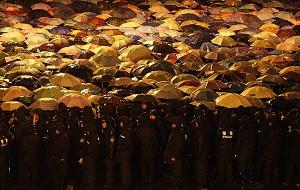GUANGZHOU–Tens of thousands of Chinese crammed into a railway station in Guangzhou on Thursday, desperate to get home for a major holiday after days of delay caused by snow and showing signs of losing their patience.
Tempers flared as families and migrant workers surged into the station two days after being told they would have to stay in the southern metropolis for the Lunar New Year holiday. For millions, this is their only chance to see family all year.
“How do you expect us to get up there? What arrangements are in place?” yelled Lai Lihua, a textile worker from the Guangxi region, adjoining Guangdong province, at a policeman.
The officer could only repeat that people must wait until they could reach the platforms and board trains.
“I have less information than you do,” he said.
China has turned its battle against brutal winter weather into a propaganda push to try to comfort millions of cold, stranded and dismayed citizens, even as storms threaten to continue lashing many areas.
Snow, sleet and ice blanketing much of central, eastern and southern China have killed dozens, cut power and hobbled transport, stranding people trying to get home for the Lunar New Year holiday, which starts on Wednesday.
As the Communist Party government seeks to clear the transport chaos and ship food and coal to stricken areas, it has also launched an intense media campaign to tell citizens it can handle the hardships and prevent dismay from turning into unrest.
“After 30 years of reform and opening up, we’ve accumulated a strong material foundation and as long as we’re vigorously organised, we will be fully able to vanquish the current hardship,” CCP leader, Wen Jiabao told officials in Guangzhou.
For Party leaders, battling the natural disasters that regularly befall the huge, poor country is a chance to reinforce the need for top-down rule. Floods in 1998 and other calamities have also been opportunities for similar propaganda drives.
“When one place suffers misfortune, aid comes from all directions,” said the People’s Daily, the Party’s official mouthpiece. “That is the traditional virtue of the Chinese nation and even more it is a vivid portrait of the superiority of the socialist system.”
More than 60 people have died, including 25 on Tuesday in a bus crash on an icy mountain road.
The state-run China Daily praised an outpouring of philanthropy to help those in need, but warned in an editorial no mercy would be shown to profiteers.
“These despicable economic creatures should be put to shame before the fine citizenship the overwhelming majority has demonstrated,” it said in an editorial without elaborating.
Uplifting songs
Wen visited stranded travellers in central China and then in Guangzhou, with state television repeatedly showing him apologising for the disruption and comforting citizens.
State television has described the hardships but stressed stories of tireless railway workers, police and officials and the six electricity workers who died while repairing power lines.
Live-to-air updates on relief efforts have also featured an uplifting song. “We all belong to one family, a loving family,” it goes.
People pouring towards Guangzhou’s main station after spending the night crammed in halls and other temporary shelters remained focused on somehow getting on a train.
“It’s nice to know that the state is thinking about us, but I am not optimistic,” said Quan, a real estate salesman who was trying to find a train to his home in neighbouring Hunan province.
All the country’s main airports were open, with just one minor one still shut on Thursday due to snow and ice on the runway, the civil aviation regulator said.
Guangzhou station will send off 200,000 passengers on 80 trains on Thursday, media reported, as power is restored to electric trains. Trucks stuck on icy highways are also beginning to move.
Even in the middle of disaster, Chinese officials’ capacity to provide instant statistics has not slowed.
The Ministry of Civil Affairs has estimated that by Tuesday, direct economic losses from the harsh weather amounted to 32.7 billion yuan ($4.5 billion).
But the national weather forecaster said snow and sleet would continue to hit parts of central, eastern and southern provinces over the next 10 days.





